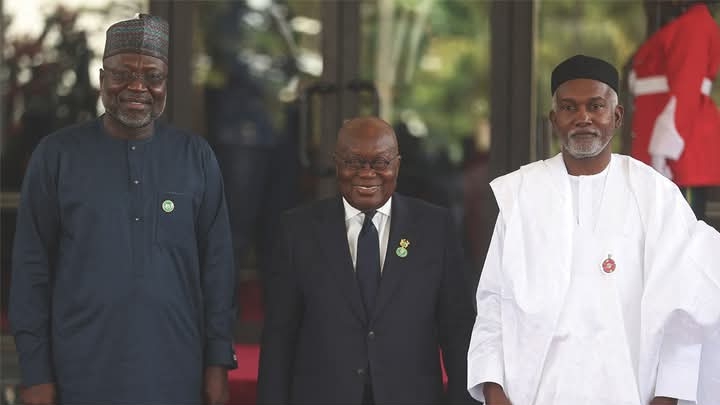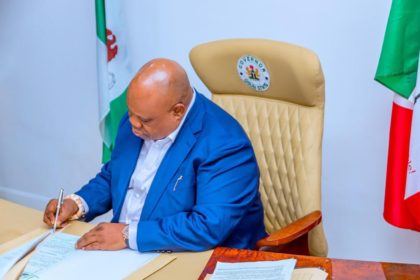By Adeyemi Adekunle
ABUJA, NIGERIA – The Economic Community of West African States (ECOWAS) has approved a transitional timeline for the withdrawal of Niger, Mali, and Burkina Faso, marking a critical step in the process that began when the three nations announced their decision to exit the regional bloc earlier this year.
The transitional period will run from January 29, 2025, to July 29, 2025, according to a decision announced on Sunday during the ECOWAS summit in Abuja, Nigeria.
Omar Touray, President of the ECOWAS Commission, confirmed the resolution, noting that the bloc would keep its doors open to the three nations during the transition.
“The authority decides to set the period from January 29, 2025, to July 29, 2025, as a transitional period and to keep ECOWAS doors open to the three countries during the transition period,” Touray stated.
The decision follows a year of failed mediation efforts after Niger, Mali, and Burkina Faso, all under military leadership, declared their intent to leave ECOWAS in January 2024.
The juntas accused the bloc of imposing “inhumane and irresponsible” sanctions in response to military takeovers while failing to address their security challenges.
Nigeria’s President Bola Tinubu, who chairs ECOWAS, emphasized the need for regional cooperation, despite the difficulties faced.
“We must not lose sight of our fundamental responsibility, which is to protect our citizens and create an enabling environment where they can prosper,” Tinubu said, underscoring the importance of solidarity among member states.
The departure of the three nations raises concerns about the future of regional cooperation, particularly in areas such as trade, free movement of people, and collective security.
ECOWAS membership provides citizens of member states with visa-free travel across the region, but it remains unclear how this benefit will be affected after the withdrawal is finalized.
The juntas have already begun taking steps to operate outside ECOWAS frameworks. In a joint statement released on Saturday, they affirmed that their territories would remain visa-free for West African citizens but reserved the right to deny entry to individuals they deem inadmissible.
For decades, ECOWAS has served as a regional body promoting economic integration, free movement, and political stability in West Africa. The withdrawal of Niger, Mali, and Burkina Faso presents challenges to the bloc’s mission and highlights growing political divides within the region.
Analysts have noted that the military governments are prioritizing their sovereignty while navigating ongoing domestic security crises, particularly the fight against jihadist insurgencies.
Babacar Ndiaye, a senior fellow at the Timbuktu Institute for Peace Studies, observed that this is one of the most significant tests ECOWAS has faced since its establishment in 1975.
“The current situation reflects the bloc’s difficulty in managing the political instability that has taken root in the Sahel region,” Ndiaye stated.
Mucahid Durmaz, a senior analyst at Verisk Maplecroft, pointed to ECOWAS’ insistence on a swift return to democratic rule as a major factor in the strained relationship.
“The bloc’s inconsistent responses to coups in the region have raised questions about its commitment to its founding principles,” Durmaz explained.
He added that recognizing the juntas’ governments risks undermining ECOWAS’ credibility, while sustained pressure for a democratic transition could further alienate the three nations.
The security crises in Niger, Mali, and Burkina Faso, exacerbated by insurgent attacks, have been a key driver of dissatisfaction with ECOWAS. The juntas argue that the bloc’s sanctions and interventions have failed to address the realities on the ground, particularly the need for effective military responses to rising violence.
ECOWAS’ handling of the situation has drawn scrutiny, with critics pointing to inconsistencies in its approach to addressing military takeovers. The threat of military intervention, imposed sanctions, and delayed mediation efforts have fueled tensions, making a resolution more challenging.
Efforts to rebuild relationships between ECOWAS and the departing nations have been ongoing, with mediators such as Senegalese President Bassirou Diomaye Faye engaging directly with the military governments. However, the juntas’ firm stance on withdrawal suggests little room for immediate compromise.
The economic implications of the exit are also a source of concern. For decades, ECOWAS has facilitated trade, cross-border movement, and regional development among its members.
The departure of Niger, Mali, and Burkina Faso could disrupt established trade routes and agreements, particularly in the Sahel region, where economic challenges are already significant.
Touray previously warned of the risks associated with leaving the bloc, particularly regarding free trade and mobility agreements. “When you get out of an agreement… the risk of losing those concessions remains,” he said earlier this year.
Despite the challenges, ECOWAS leaders have reiterated their commitment to maintaining the bloc’s core mission of regional cooperation and economic integration. The approved transitional timeline represents a formal acknowledgment of the juntas’ decision while leaving open the possibility of future dialogue.
As Niger, Mali, and Burkina Faso prepare for their exit, the focus remains on the broader implications for regional stability.
The transition will test ECOWAS’ ability to adapt to the evolving political dynamics in West Africa while upholding its founding principles.
For the citizens of the region, questions remain about how the withdrawal will impact their daily lives, particularly in terms of trade, travel, and security.
The Abuja summit was closed with a renewed call for unity among the remaining member states and a recognition of the complex realities facing West Africa. With the transitional period set, the next steps will determine whether dialogue can be revived or if the bloc must adapt to a new geopolitical landscape.




